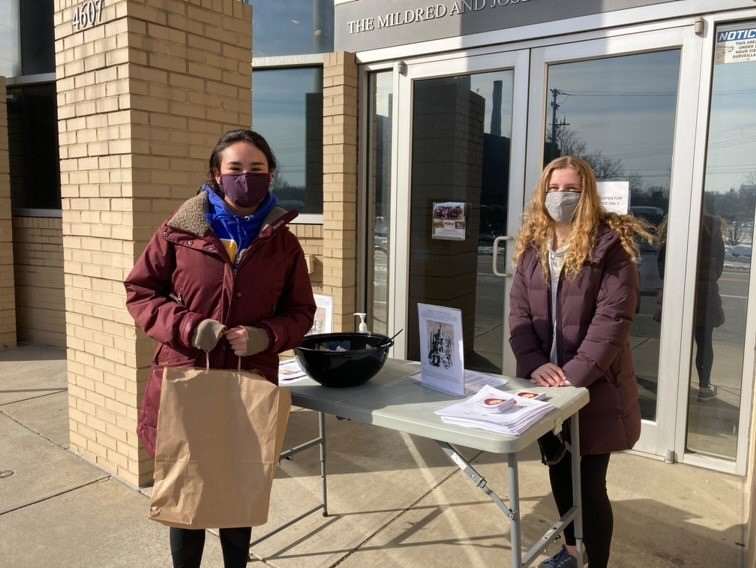Shimonov also leads the new American Sephardi House Fellowship program, which immerses Sephardic Jewish college students in the intellectual and cultural legacy of the Sephardic tradition. The fellowship is designed so the new generation of Sephardic leaders can acquire knowledge about the greater Sephardic experience to take ownership of their Sephardic identity, said Shimonov. The 13 fellows—representing campuses across the U.S. and different Sephardic backgrounds—participate in a yearlong program that incorporates text study, monthly group discussions and guest lectures by leading scholars and artists, and leadership training. An important component is creating original projects reflecting their own Sephardic identity and skill sets, which they share with their campus community such as: an online art exhibit, Shiviti, produced in May by Rochelle Dweck—a studio art major at Syracuse University who comes from a Syrian and Egyptian background—that reflects her research of ancient Syrian synagogues where Shiviti images on the walls are a reminder of God’s presence; a Shabbaton organized by Ariella Niego Levy at the University of Pittsburgh that showcased the Sephardic cuisine of her Ladino-speaking ancestors from Greece and Turkey; and a 10-minute music video about the Sephardic experience produced by Queens College student and musician Dvir Avnon-Klein, the descendant of Spanish Jews who lived in Jerusalem for generations.
If this music helped Jews sustain their heritage, it can help contemporary Jews maintain the bond,” said Avnon-Klein, who also plays in Chutzpah Caravan, his family’s band, “it is important for me to keep this musical tradition alive.
The fellowship was conceived by Joshua Benaim, a real estate entrepreneur and operatic baritone—and author of the forthcoming book Real Estate, A Love Story: Wisdom, Honor, and Beauty in the Toughest Business in the World, which makes a passionate case for incorporating old world values and the humanities into business. “Amid antisemitism and the contentious political environment, I wanted to light a candle,” explained Benaim. “I realized the best antidote would be a positive and joyful immersion in poetry, philosophy, history, spirituality, and music. To me, Sephardic Jewish culture has always been able to synthesize the spiritual and Jewish world with the world of science, philosophy, and business.”
Sephardic Jewry celebrated at Hillel JUC’s annual summit
Deluxe dinner, Havdalah and cooking demonstration broaden students’ cultural awareness

Hillel JUC students were given a taste of Jewish culture during a special Sephardic-themed Shabbaton last weekend, when hundreds of students enjoyed a deluxe Shabbat dinner to-go, Havdalah with Israeli maestro Yaniv Attar and a cooking demonstration with chef and author Hélène Jawhara Piñer.
The multifaceted program gave nearly 300 students a chance to “learn and celebrate their Judaism,” said Dan Marcus, Hillel JUC’s president and CEO.
In years past, the annual Ignite Summit has enabled students to circle around Shabbat tables, enjoy meals and hear from Jewish luminaries, including neuroscientist and actor Mayim Bialik and Israeli jewelry artist Ariel Tidhar. This year, even in the midst of the pandemic, “it was essential that we still had our annual Ignite Summit,” said Marcus. “It’s such a highlight of the year.”
Due to COVID-19 restrictions, this year’s summit was largely conducted online. Shabbat dinner and dessert were available for Friday afternoon pickup, but written materials related to Sephardic Jewish life, culture and migration were posted online. Havdalah and the cooking demonstration were also shared virtually.

Ariella Levy, a University of Pittsburgh sophomore, began planning the weekend’s activities in November. As a Hillel JUC Ignite intern, and a Sephardi House Fellow, Levy worked with staff from Hillel JUC and the American Sephardi Federation to ensure students from diverse backgrounds could better appreciate the history and nuances of Sephardic Jewry.
For many people on campus, there’s a misconception that Sephardic Jews reside solely in Israel or that “all Jews are white or from Europe,” said Levy. “There are Jews from Africa, Asia and the Middle East, and it’s important to share their stories not only for diversity purposes but also for people to learn about their cultures.”
Danielle Kranjec, Hillel JUC’s outgoing senior Jewish educator, credited Levy with creating a multisensory experience authentically capturing Sephardic traditions.
Jamie Frame, a University of Pittsburgh senior, participated in the weekend with his roommates and friends. The five-person pod regularly celebrates Shabbat, but being able to do so with Sephardic overtones was a learning experience, explained Frame, who described himself as “coming from a very traditional, very Ashkenazi background.”

Between watching Attar’s Havdalah service and partaking in Piñer’s cooking demonstration, Frame gained a new appreciation for Sephardic Jews generally, and some childhood friends in particular.
“We have a whole bunch of Sephardi community members at our synagogue back home in northern Virginia, but my interaction was always at synagogue,” he said. “I had heard how they lained Torah or led davening but had never seen them lead Havdalah or cooked with them.”
After following Piñer’s instructions on how to make fideos, Frame reached out to a Sephardic high school classmate and asked if he knew anything about the pasta dish.
“He was like, ‘Of course I know that. My mom makes a delicious one,’” said Frame.
Zoe Levine, a Chatham University senior, also participated in the cooking demonstration.
“I am Ashkenazi, not Sephardi, and it was really interesting to learn about another aspect of Judaism,” said Levine. “This is a part of my people’s culture.”
Having students appreciate that Judaism encompasses more than the Ashkenazi experience is part of a larger goal, explained Levy.
“My takeaway is to keep going — this was only one event,” said Levy. “I’d like to see Sephardic Judaism integrated into other events as well.”
Whether that means creating a Sephardic heritage group, including more Sephardic music at Hillel JUC events or encouraging the organization to offer a broader menu when it comes to its Shabbat to-go meals, Levy has several ideas moving forward.
“Of course it’s great to have an event that’s centered around Sephardic culture,” she said, “but there won’t be major changes until we have it incorporated into the events we already have.” PJC
Adam Reinherz can be reached at areinherz@pittsburghjewishchronicle.org.
Announcing the Sephardi House Fellowship
Wisdom, Creativity, & Community on Campus.
The American Sephardi Federation (ASF) is announcing today the launch of a new program—the Sephardi House Fellowship—designed to immerse Jewish college students in the intellectual and cultural legacy of the Sephardic tradition.
Henceforth, the ASF will appoint Sephardi House Fellows annually at colleges and universities nationwide, with the mission of creating a warm and welcoming environment in which to discover the vast diversity, depth, and vitality of the Jewish people. Through a dynamic yearlong learning experience, the Fellows will deepen their knowledge of the multifaceted Greater Sephardic world and explore the “seriously Jewish, yet worldly and cosmopolitan” classic Sephardic tradition, while also developing leadership skills and their passion for community building.
The program is led by educator, social entrepreneur, and artist Ruben Shimonov, with the full ongoing support of the ASF.
The ASF is also proudly announcing this year’s appointment of 13 Sephardi House Fellows on campuses across the United States, ranging from UCLA to CCNY’s Macaulay Honors College. Chosen via a competitive application process, the Fellows have very varied Greater Sephardic backgrounds (Balkan, Bukharian, Egyptian, Greek, Lebanese, Moroccan, Persian, Syrian, Yerushalmi) and academic majors, including architecture, finance, neuroscience, mathematics, studio art, and physics. What unites them is a commitment to advance Jewish unity through our shared Sephardi roots.

“This is an incredibly accomplished and eclectic group of young leaders. I am excited for the journey that we will be taking together,” said Shimonov, who also serves as VP of the ASF Young Leaders and lectures at the ASF’s Institute of Jewish Experience.
The wisdom and warmth of the Sephardic tradition has much to offer to humanity. In these challenging times, we need that resilient spirit that has been passed down through the ages in the form of Sephardic poetry, philosophy, music, food, and spirituality. In a moment where being Jewish on campus is not always easy, I feel Sephardi House can make a difference,” said Joshua Benaim, the visionary creator of the Sephardi House Fellowship. Benaim, a Harvard University and Harvard Business School alum, is the Founder & CEO of Aria Development Group.
“The idea for the Sephardi House Fellowship arose out of Josh’s love for the classic Sephardic tradition, appreciation for the challenges facing young Jews on campus, and a desire to honor his father, Carlos, one of the world’s premier perfumers,” said Jason Guberman, ASF’s Executive Director, who added: “With great enthusiasm, we welcome our inaugural cohort of Sephardi House Fellows for the 2020-2021 academic year.”
Growing up in Tangier in a Sephardic Jewish family left an indelible imprint on my life and values. I want to ensure that the next generation will have the opportunity to experience this culture at an important moment in their lives,” said Carlos Benaim, a distinguished ASF Board Member.
Sephardi House Fellows receive individualized mentorship, full access to all ASF programs, a $1,000 stipend and additional support to further activities on campus, as well as participate in exclusive monthly sessions illuminating aspects of Greater Sephardi history, philosophy, and culture.
Esther Bentolila, a Sephardi House Fellow and junior at Cornell University, said: “I am beyond excited for this opportunity to bring Jewish students together from all walks of life to discuss different aspects of the culture, such as art, music, and literature. The contributions of great Sephardic Rabbis and thinkers is an area I particularly cherish, and I have a passion for Judaism and a hunger for knowledge.





